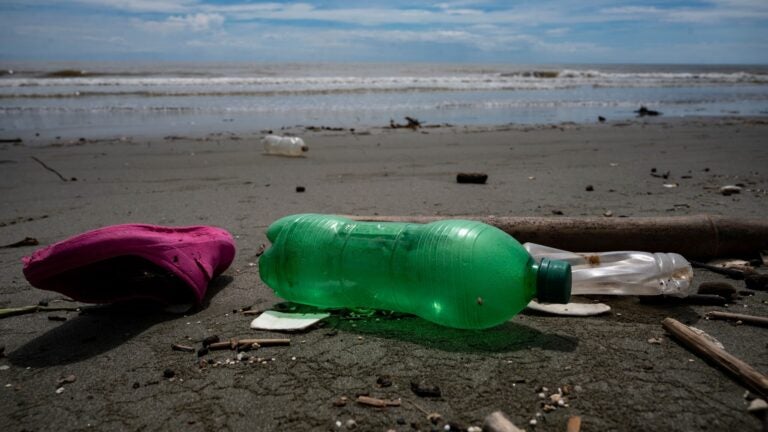Politics
The governor said Massachusetts would be the first U.S. state to institute such a ban, which she hopes will help protect ocean life and reduce carbon emissions.

Massachusetts Gov. Maura Healey announced her plan to ban state agencies from buying single-use plastic bottles Monday during a speech about the importance of clean oceans and biodiversity.
During a speech at the Clinton Global Initiative in New York City, Healey said the ban, which is meant to protect ocean life and reduce carbon emissions, would be the first enacted by a U.S. state.
“Plastic production and plastic waste are among the leading threats to our oceans, our climate, and environmental justice. In government, we have an obligation to stop contributing to this damage and chart a better path forward,” she said.
Healey’s office said the governor plans to enact the ban through an executive order on Thursday.
How the ban will impact Massachusetts
The ban will be most noticeable when visiting state agencies, which purchase about 100,000 plastic bottles a year across all departments, Healey’s office said. For example, the governor’s office won’t be giving out bottled water in meetings. Instead, her office said, visitors will see more water coolers and other types of water dispensers.
There are some exceptions to the ban, Healey’s office said. It doesn’t apply to current contracts, or when there is no alternative to plastic bottles, such as during emergencies.
“We are also encouraging all Massachusetts quasi-public authorities and boards to adopt their own plans to eliminate their purchasing and sale of single-use plastic bottles,” Healey’s office said in a statement.
According to the Sierra Club of Massachusetts, Americans use about 50 billion single-use plastic water bottles a year, but only about 29% of those get recycled. Not only do these bottles remain in the environment for 1,000 years, but between the fossil fuels used to make them and their post-use impacts, the environmental group said the carbon footprint of bottled water is 11 to 31 times greater than tap water.
According to the Center for Biological Diversity, swirling convergences of plastic make up about 40% of the world’s ocean surfaces, and much of it is single-use plastic. The plastic can be deadly for marine life, it said.
These are among the reasons why, in 2012, Concord became the first municipality in the state to ban the sale of single-use plastic water bottles. Since then, 24 other municipalities have done the same.
Healey addresses biodiversity loss
In addition to the bottle ban, Healey said she’d issue an executive order that would direct the state to establish biodiversity conservation goals for 2030, 2040, and 2050. The state would also be tasked with developing strategies to meet these targets.
The resulting biodiversity protections would be “the strongest in the nation,” Healey promised in her speech. These will include steps to shield the state’s salt marshes, which protect from storm impacts and remove carbon from the atmosphere. Officials will also look at strategies such as establishing “marine protected areas” that would safeguard coastal and ocean habitats, she said.
The governor highlighted that Massachusetts is home to 432 species that are endangered, threatened, or of special concern, and that worldwide, about a million species are on the brink of extinction.
“We have spent decades working to protect our natural resources. But with climate change accelerating the decline, biodiversity loss threatens public health, economic stability, food security, and our emissions goals,” Healey said.
The governor also touted actions she’s taken to address environmental issues since she took office earlier this year, such as establishing a state cabinet-level climate chief, creating a state climate bank, and issuing over $31 million in grants to municipalities for climate resilience efforts.
“In our coastal state, we know climate change is our biggest threat. We also believe that taking action is our greatest opportunity – to secure a safe, prosperous, and sustainable future,” Healey said.
Reactions to the ban
Many Massachusetts environmental groups praised the ban on Monday.
“Today’s announcement uses the power of the executive branch to take swift action to protect the ocean biodiversity that has supported our state for centuries,” Environmental League of Massachusetts Vice President Amy Boyd Rabin said in a statement.
“It’s a bold move, which we need more of,” Mass Climate Action Network Executive Director Elischia Fludd said in a statement. “Leading by example to curb unnecessary plastic consumption is a good starting point.”
Julia Blatt, executive director of Massachusetts Rivers Alliance, said her organization supports the ban because plastic bottles often end up in rivers and streams, and because bottled water is less regulated and often less safe than tap water.
“Bottled water is also many times more expensive than tap water, so when the state agencies buy those little bottles, they are wasting taxpayer money,” she said in a statement.
But not everyone involved in state politics was pleased. Jim Davidson, a candidate for the Massachusetts Republican State Committee, tweeted Monday, “Of all the issues facing Massachusetts, Maura Healey decides banning plastic bottles and bowing down to the Clinton Initiative is a top priority.”
Newsletter Signup
Stay up to date on all the latest news from Boston.com